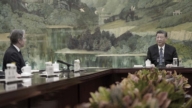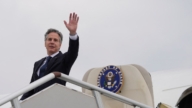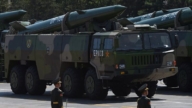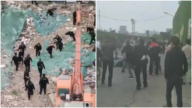【新唐人2014年11月10日讯】中共当局今年推出了“猎狐2014”行动,把反腐运动伸向海外。在日前北京召开的亚太经合组织首脑会议上(APEC),与会成员国讨论了合作反腐问题,并发表了反腐宣言。那么,中共有多大能力、又如何在海外展开行动?请看以下分析报导。
从今年七月以来,中共公安部就发动了“猎狐2014”行动,缉捕在逃境外的贪官。据官方数据,到十月底,已经抓获了180多名携款外逃的贪官,其中44人涉案金额在千万人民币以上。
日前在北京召开的APEC峰会上,中共也与APEC其他成员国讨论了如何建立合作网路协作反腐问题,会上还通过了北京“反腐败宣言”,希望能加大追踪潜逃国外的腐败官员力度。
不过,据《美国之音》披露,一个鲜为人知的事实是,中共为追回外逃贪官的赃款,有时需要和协助国家分享巨大的利益。
香港立法会议员黄毓民8号在香港《太阳报》刊文称,此前有香港媒体披露,协助国家以美国为例,“重大协助”时,美国能分享的比例为五到八成,“较大协助”也能分享到四至五成。
美国南卡罗莱纳大学艾肯商学院终身教授谢田表示,在没有引渡条约的情况下,中共确实需要对花费人力、物力的国家付费,就像在西方国家追债公司的分成那样。
美国南卡罗莱纳大学艾肯商学院终身教授谢田:“跨国进行这种调查或者引渡罪犯回国的话,在另外一个国家有适当的费用的,但是中国实际上跟大部分国家都没有引渡的条约。”
《太阳报》指出,这种海外猎狐反贪,中共不仅代价巨大,而且还违反《联合国反腐败公约》的“被贪污的公款必须返还”原则。
根据2011年央行披露的资料显示,外逃贪官携款超过了8000亿人民币。
不过实际上,中共贪官向海外转移的资产,远不止被披露出来的8000亿。
在2012年,英国《路透社》就根据“全球金融诚信”(Global Financial Integrity)的报告指出,过去十年流出中国的非法资金高达3.8万亿美元,折合人民币20多万亿。今年初,“国际调查记者同盟”发布的大陆和香港离岸投资调查报告也揭示,自2000年以来,有1万亿到4万亿美元的资产从大陆流出。
谢田表示,中共的大部分高官在海外都有私人资产,他们的子女、配偶也有不少到美国等西方国家定居,这些都限制了中共只能是选择性反腐,而不能真正实施全面反腐。
谢田:“问题的根本就在于反腐并不是中国的一个国家的政策,它更没有一个正常的这样一个国策,实际上中国腐败的根源就是中共本身自己。所以,中共反腐不是一个合理的、合法的、堂堂正正的一个举动,而是中共内斗的一个工具,使他们不敢把它拿到台面上来。”
谢田指出,如果中共真正反腐,实际上就是反他们自己,中共就要倒台。这是他们所不能忍受的,也是中共不能与其他民主国家共用资讯、达成真正反腐协议的原因。
事实上,中共贪官首选为避风港的美国、加拿大和澳大利亚,不仅与中共没有引渡协议,而且这些国家的司法制度也是中共海外“猎狐”的障碍。
例如,前远华集团创始人赖昌星在2011年被从加拿大引渡回中国,但在此之前经历了12年的漫长引渡诉讼过程,中共还作出不判他死刑的承诺﹔中共2004年把在美国的原中行广东开平支行行长余振东引渡回国,虽然他被指控非法侵占4.85亿美元的银行资产,但美国遣送条件就是余振东不得遭受虐待或被判处死刑。
此外,政治因素有时也会是中共海外反腐的障碍。
中共前外交人员、现华盛顿智库大西洋理事会资深研究员杨恒均对《美国之音》指出,那些潜逃官员几乎都会携带一些机密文件,或者向西方国家泄露中共的“国家机密”。如果受到追捕,他们就声称自己是“政治迫害”的对像,让西方国家政府左右为难。
这样看来,逃到海外的“狐狸”比“老虎”和“苍蝇”难打得多,中共的“海外猎狐”绝不轻松。
采访/陈汉 编辑/宋风 后制/周天
The Challenges in Expanding Anti-Corruption Overseas
This year, the CCP started the“Hunting Foxes 2014” campaign
and expanded the anti-corruption movement overseas.
At the APEC summit in Beijing, world leaders discussed how
to calibrate on international anti-corruption and
published a declaration on anti-corruption as well.
What price has the CCP to pay and what challenges has it to face
when expanding anti-corruption overseas?
Please read the report below.
At the Summit , the CCP representatives also discussed how
to carry out anti-corruption via international collaboration.
A joint “Declaration on Anti-Corruption” was agreed so that
corrupt officials who fled abroad can be chased more effectively.
However, as disclosed by VoA (Voice of America),
in order to trace back the huge amount of money
that corrupt Chinese officials took overseas, sometimes
the party has to agree to share the pie with the country
that assists in the process.
Wong Yuk-man, Member of Hong Kong Legislative Council,
published an article in Hong Kong “The Sun Daily News” Nov 8.
In it he mentions, sometimes the country, like the U.S.,
that greatly assists in tracing corrupt officials can receive
50 to 80% of the profit. Even the country that offers
“relatively great assistance” can receive 40 to 50%.
Xie Tian, University of South Carolina, Aiken Business School,
said that the party needs to reimburse other countries
for the cost in manpower and physical resources
when there is no extradition treaty between them.
It’s like how one has to pay collection companies in the West.
Xie Tian:“The third country is normally paid a reasonable
amount for international investigation and extradition.
However, China hasn’t set up extradition treaties
with most of the countries.”
“The Sun Daily News” pointed out that not only is the party
paying a huge price to trace corrupt officials abroad
but it’s against the principle of
“embezzled public funds needs to be fully refunded”
from “UN Convention against Corruption”.
As disclosed by China Central Bank in 2011,
more than 800 billion Chinese yuan flew out of China when corrupt officials fled overseas.
In actuality, the amount of assets the party’s corrupt officials
took with them are worth far more than 800 billion.
In 2012, based on the reports of “Global Financial Integrity”,
Reuter reported that in the past 10 years as much as
3,800 billion U.S. dollars, or 20,000 billion Chinese yuan,
illegally flew out of China.
Xie Tian said most of the party officials own overseas property.
Their children and spouses live in the U.S. or other western countries.
Therefore, the party can only selectively perform anti-corruption
and it’s impossible to be thorough.
Xie Tian: “The root problem is that anti-corruption is not part
of the national policies. Actually, the party itself is the root cause
of the corruption. Therefore, the party’s anti-corruption
is not reasonable, legal or upright.
It’s nothing but a tool used in faction struggles.
It’s not something they dare to put on the table.”
Xie Tie also points out that, if the party is really fighting against
corruption, it is actually fighting against itself.
The party itself will collapse because of this.
This is not something that they can bear.
That’s also the reason why the party is not willing to share
common resources with democratic countries and achieve international agreements on anti-corruption.
The corrupt officials prefer the U.S., Canada and Australia
as their safe harbors because not only don’t these countries
have extradition treaties with China, but the legislative systems
in these countries are obstacles for the party to track them down.
For example, Lai Changxing, former founder of Yuanhua Group,
was extradited from Canada in 2011.
But, the extradition proceedings lasted 12 years.
The party also had to promise not to sentence Lai to death.
In 2002, the party extradited Yu Zhendong,
former M D. of Kaiping Branch of Bank of China, Guangdong.
Though Yu was charged with illegal embezzlement of
0.485 billion U.S. dollars, the U.S. government only agreed the extradition if he wouldn’t be tortured or sentenced to death.
In addition, political factors are also obstacles for the party
to carry out anti-corruption overseas.
Yang Hengjun, former party diplomat and current member of
Washington Atlantic Council, explained to Voice of America
that most officials that fled overseas carry with them
confidential documents. They might disclose party “secrets”
to western countries. If they were hunted down,
they would declare they are “politically persecuted”,
which puts western governments in a dilemma.
In this way, those “foxes” that fled overseas are even harder
to catch, compared to the “tigers” and “flies”.
It’s not an easy job for the party to track “overseas foxes” down.
Interview/ChenHan Edit/SongFeng Post-Production/ZhouTian




























